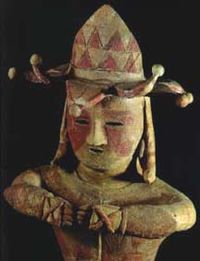Wu (state)
State of Wu | |||||||||||||
|---|---|---|---|---|---|---|---|---|---|---|---|---|---|
| BCE–473 BCE | |||||||||||||
| in BCE in BCE | |||||||||||||
| Status | Kingdom | ||||||||||||
| Capital and largest city | [[]] | ||||||||||||
| Common languages | Old Chinese, Native language on the non sinicized aboriginals | ||||||||||||
| Religion | Taoism, Chinese folk religion, ancestor worship | ||||||||||||
| Government | Monarchy | ||||||||||||
| King | |||||||||||||
• BCE– BCE | [[]] | ||||||||||||
• BCE– BCE | [[]] | ||||||||||||
| Chancellor | |||||||||||||
• 221 BCE–203 BCE | Wu Zixu | ||||||||||||
| History | |||||||||||||
• Foundation by Taibo | BCE | ||||||||||||
• Defeated by Yue | 473 BCE | ||||||||||||
| Currency | Chinese coin | ||||||||||||
| |||||||||||||
Wu (吳) was a state during the Spring and Autumn Period in China. The state of Wu straddled the mouth of the Yangtze River (Chang Jiang) east of the State of Chu. Considered a semi-barbarian state by ancient Chinese historians, its capital was Suzhou.
According to Sima Qian, the rulers of Wu claimed to be descended from Taibo, the elder uncle of King Wen of Zhou. Realising that his younger brother, Jili, was wiser than him, and deserved to inherit the throne, Taibo would have fled to Wu and settled there. Three generations later, King Wu of Zhou defeated the last Yin emperor, and enfeoffed the descendents of Taibo in Wu.
The State of Jin aided Wu's rise to power as a useful ally against the State of Chu. In 584 BC, Wu rebelled against the State of Chu; the action occurred after being persuaded by Wuchen, a minister of the State of Jin who defected from Chu.
Afterwards, Wu would be a constant threat to the state of Chu on its southeastern flank until its demise. Wu curried relationships with Chu's vassals in the Yangtze river region to weaken support for Chu. In 506 BC, Wu launched a surprise attack and occupied the capital of Chu. Afterwards, Wu was briefly the most powerful nation, and turned to other campaigns, defeating the State of Qi in 484 BC.
Ironically, Wu was later threatened by an upstart state to its south, the State of Yue; the State of Chu aided Yue's rise to power as a counter to Wu. Although Wu won a major victory against Yue in 494 BC, it failed to completely subjugate Yue, helped in part by Yue's bribing of an important Wu minister. While Wu was engaged in a military campaign in the north, Yue launched a surprise attack on Wu in 482 BC and conquered the capital. Eventually, the State of Yue conquered Wu in 473 BC.
The leaders of Yue and Wu were kings, not dukes because they were considered "barbarian" states and did not petition the nominal Zhou court for peerage.
Wu and Yue were masters of metallurgy, fabricating excellent swords, with incised messages, geometric patterns and inlaid gold or silver. Examples include the spearhead of King Fuchai, the sword of Prince Guang (the name of King Helu before he became King) or King Helu of Wu.
Possible connection with ancient Japan

The first Wu Kingdom was united by Taibo during the Spring and Autumn Period. Originally considered a barbarian state, the people of the Wu Kingdom became Sinicized during the Warring States Period. Ambassadoral visits to Japan by the later Northern Chinese dynasties Wei and Jin Dynasty (265-420) recorded that the Wō people of Japan claimed to be descendants of the Grand Count (Tàibó) of the Kingdom of Wu.[1] Historical records also show that the ancient Japanese had similar lifestyles and customs as pre-Sinicized inhabitants of the Wu Kingdom, including tattooing, ritual teeth-pulling, and baby-carrying on backs. The Japanese tradition of eating raw fish is common in the Wu area of Jiangsu and Zhejiang. Tattooing examples are found on Haniwa statues with red paint on hands and faces. However, the Japanese language can be directly linked neither to the Wu dialect nor to any other Chinese language (NB: The Japanese language appears to be similar to the language of the Qiang, an ancient people in China according to http://zh.wikipedia.org/wiki/%E7%BE%8C%E6%97%8F). However Japanese is commonly classified as either a language isolate, or a member of the controversial Altaic family, whilst Qiang is part of the Sino-Tibetan, language family. Taibo was from the State of Zhou before Zhou became powerful enough. Historically, Zhou people and Qiang people were very closely related.) The Zhou and the Qiang are both Sino-tibetan peoples too, because the Zhou were the ancestors of the Chinese along with Shang, and the Zhou language was an ancient form of Chinese, hence it must have belonged to the Sino-Tibetan language family. But it should be noted that language has sometimes nothing to do with relations or ethnicity due to the fact that some peoples may adopt the language of another, or may combine into another language.
See also
References
- ^ Encounters of the Eastern Barbarians, Wei Chronicles
